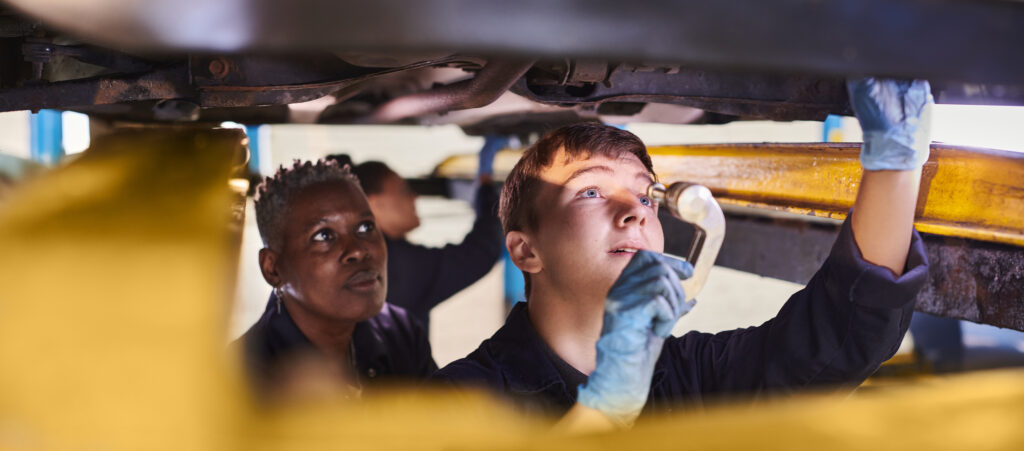
“Our loan repayments are half what we were paying on rent”
Lighthouse Futures Trust was spending £125,000 a year on rent. Now the specialist college owns its building, has more money to spend on enrichment activities and has been able to take on a new member of staff. Read more…
We spoke to Nicola Wood, Business & Finance Manager, and Sharon Davenport, Marketing, Events and Partnerships Coordinator, about the benefits of owning over renting, and how they found the process of getting a loan from Charity Bank.
Tell us about Lighthouse Futures Trust
Nicola: We provide a supported-internship programme for young people with an Education Health and Care Plan (EHCP). We find them a role that they’re interested in. They do that role for a full year, supported by our job coaches. At the end of the year, the employer often decides to take the young person on as a permanent member of staff, but if they don’t, our employability job coach will work with the young person to find a different paid role.
One young man has been working at John Lewis for five years. Another ex-student is now a phlebotomist. These young people had often been written off, but they just needed a chance.
Why did you need a loan from Charity Bank?
Nicola: We started with four students and have grown over the last few years. A couple of years ago, we realised that we needed our own premises. We were renting a building and wanted to buy that, but it was too large and there was no way we could afford it. So, we found this site. We took a lease out at the beginning of May 2023 and bought the building a year later. Our pre-internship programme is now based here and so are our offices. It’s in Headingley – a very vibrant area of Leeds. Lots of students live here and it’s good for transport links.
Buying the property has given us security and means that we can take on more students.
Why did you choose Charity Bank for your loan?
Nicola: Our Operations Director at the time, Sally-Anne Greenfield, knew of Charity Bank so introduced us. Charity Bank was supportive right from day one. They were just brilliant, completely understood what we were trying to do and wanted to help us. From our point of view, we couldn’t have had a better relationship.
How did you find the process of applying for the loan from Charity Bank?
Nicola: There was a fair bit of financial due diligence to go through. We had to do three-year plans and so on to show that we could afford the repayments, but it wasn’t any more difficult than we expected.
The process did take longer than we’d originally thought. Everything had to be agreed by the trustees, which takes time, and the legal process took time. The Charity Bank loan was for 65% of the value, and we had a 50% grant/50% loan from the People’s Postcode Lottery (PPL). That meant debentures had to be drawn up and a deed of priority created between Charity Bank and PPL so that Charity Bank has the first charge on the building. We hadn’t realised that would be needed, so it did delay matters and there was a lot of extra paperwork.
Was the team at Charity Bank helpful if you had any questions?
Nicola: Yes, really helpful. We had our main contact at the beginning, Jeremy. Then, once we knew it was all going through, the Lending Services team stepped in. They were really good at nudging us to hurry things along.
Were there any other challenges to the purchase?
Nicola: After we had the valuation done, we ended up having to fund a bit more than we originally planned. But that was fine, because we had the reserves to do that.
How do your loan repayments compare to the rent that you were paying?
Nicola: They’re so much better. When we were doing our projections, it was clear that buying our own building was going to be much cheaper. We were paying £125,000 a year on rent for our old building. The PPL loan is over seven years at a fixed rate, whereas the Charity Bank loan is over 25 years and linked to the Base Rate. Together, our loan repayments are around half what we were paying on rent. The Charity Bank loan is interest-only for 12 months as well, to give us a little bit of leeway.
Sharon: The money we’re saving on rent gives us capacity to pay for more non-essentials, like suits for students when they’re going to interviews, an art therapy club and so on. We’ve even been able to fund a part-time HR person.
Nicola: We’ve also been able to lease a minibus (the one we were using before was really old and clunky) and build up our reserves to give us more financial stability.
I’d have to say “no” to everything, but now I can say “yes” to more things. We’re on a much more stable footing. There’s a cost involved in making a building fit-for-purpose, so it’s better to spend that money knowing you’re going to be in the building for the long-term.
What are the other benefits of owning over renting?
Nicola: We feel more secure. Even on a seven-year lease, there’s always a danger that the landlord will decide to sell or increase the rent. While our loan is linked to the Base Rate, we have a pretty good idea what our repayments are going to be for the next 20 odd years, which gives us stability and helps us to plan.
From an SLT point of view, we spent a lot of years worrying about where we were going to move to and visiting properties. There were a couple of years where we never knew from one month to the next whether we were going to be renewing our lease or not, so it was pretty stressful.
Another good thing about owning the building is we can apply for grants to do capital works. If you’ve got a lease, no one’s going to give you funding to make changes to the building. Owning also makes us feel more like a legitimate organisation somehow. We can say, “This is us, and this is where we are. We’re not moving.”
Sharon: That’s really important because the young people we work with need that stability; new venues can make them feel uncomfortable. We’ve also now got a great piece of real estate in a popular area of Leeds.
Would you go back to Charity Bank if you needed another loan?
Nicola: Yes. We plan to develop our if we can, and we’d go to Charity Bank first. In fact, Jeremy came round to see us once we were up and running and said, “As soon as you’re ready to do the next phase, just give me a ring.” It’s nice to know that option is there. He also came to graduation this year with his wife and was so pleased to see the result of the bank’s lending.
What do you want to build?
Nicola: We’re currently renting a small office space up the road, where our interns do maths and English functional skills courses. Ideally, we’d like to develop facilities for our pre-internship programme, with more chill out areas and space for activities, and use the current building for the supported-internship programme and admin. I think we’re a few years away from that, but we’ve started making plans.
Is there anything that charities can do to make the loans process easier?
Nicola: You need to be proactive with all the people that you’re dealing with. We thought, “Right, we’ve given everybody what they need, so we’ll just leave them to it.” But sometimes it doesn’t work like that. You have to keep nudging everyone..
If you have two lenders, you also need to factor in the time and cost of getting the deed of priority drawn up and agreed.
What are you proudest of when it comes to the young people you work with?
Nicola: We have amazing outcomes. The goal for most supported-internship programmes is for 60% of the students to progress into paid work. We’re getting more than 80% into paid work. We’ve got young people working at John Lewis, the NHS, KPMG and HMRC.
A whole range of young people come through our doors. Some are highly intelligent but are debilitated by social anxiety; others need more time to learn. So, we’ve got ex-students who now work in the investigations team at HMRC, and others who work in a coffee shop. The ones who don’t go into a paid job often go into meaningful volunteering. Whatever they end up doing, it’s a positive outcome because they’re getting on with living their lives.
If you need a loan to buy a property for your charity or social enterprise, please complete our loan enquiry form Discuss A Loan – Charity Bank.
About Charity Bank
Charity Bank is the loans and savings bank owned by and committed to supporting the social sector. Since 2002, we have used our savers’ money to make more than 1400 loans totalling over £605m to housing, education, social care, community and other social purpose organisations.
Nothing in this article constitutes an invitation to engage in investment activity nor is it advice or a recommendation and professional advice should be taken before any course of action is pursued.


